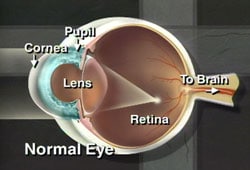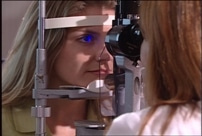
What Is Corneal Disease?
The cornea is the front of the eye and serves as a kind of window for light to pass through to the back of the eye. If you were to reach up and touch your eye, you would touch the cornea.
The cornea can be affected by various diseases including infections, corneal ulcers or dystrophies that can damage it and cause it not to be clear. Depending on the condition, we would need to institute an appropriate treatment to relieve the symptoms.

If you are noticing unusual redness or are experiencing discomfort, pain or blurred vision, your cornea may be involved. You should have an eye exam as soon as possible.
Symptoms Of Corneal Disease:
- With keratoconus, as the cornea protrudes or steepens, vision becomes increasingly blurred and contact lens wear, which is often an early treatment for the disease, becomes difficult. The contact lens may not stay on the eye due to the irregular shape of the cornea.
- A person with Fuchs’ endothelial dystrophy or bullous keratopathy may first notice glare with lights at night or in bright sunlight. As these conditions progress, vision may be foggy or blurry in the morning and clear up as the day progresses. As the diseases further progress, vision will stay blurrier later into the day and eventually may not clear at all.
- Some corneal diseases can be very painful.
Keratoconus is a weakening and thinning of the central cornea. The cornea develops a cone-shaped deformity. Progression can be rapid, gradual or intermittent. Keratoconus usually occurs in both eyes, but can occur in only one eye.
Fuchs’ endothelial dystrophy is a hereditary abnormality of the inner cell layer of the cornea called the endothelium. The purpose of this layer is to pump fluids out of the cornea, keeping it thin and crystal clear. When the endothelium is not healthy, fluids are not pumped out and the cornea develops swelling, causing it to become cloudy and decrease vision.
Bullous keratopathy is a condition in which the cornea becomes permanently swollen. This occurs because the inner layer of the cornea, the endothelium, has been damaged and is no longer pumping fluids out of the tissue.
What Causes Corneal Disease?
- Infection: Bacterial, fungal and viral infections are common causes of corneal damage.
- The cause of keratoconus in most patients is unknown.
- Age: Aging processes can affect the clarity and health of the cornea
- Cataract and intraocular lens implant surgery: Bullous keratopathy occurs in a very small percentage of patients following these procedures.
- Heredity
- Contact lenses
- Eye trauma
- Certain eye diseases, such as retinitis pigmentosa, retinopathy of prematurity, and vernal keratoconjunctivitis.
- Systemic diseases, such as Leber’s congenital amaurosis, Ehlers-Danlos syndrome, Down syndrome and osteogenesis imperfecta.
How We Diagnose Corneal Disease
Your eye doctor can check for corneal disease and trauma by examining your eyes with magnifying instruments. Using a slit lamp and advanced diagnostic technology such as corneal topography, your doctor can detect early cataracts, corneal scars, and other problems associated with the front structures of the eye. After dilating your eyes, your doctor will also examine your retina for early signs of disease.

What Are My Treatment Options For Corneal Disease?
As with any serious eye infection, corneal disease should be treated immediately. Although corneal transplant is almost always the necessary treatment to restore vision when the cornea becomes clouded, there are other measures that can be taken to prolong vision in the early stages of disease.
Get In Touch With Us:
To learn more about Hattiesburg Eye Clinic and our services please call us at 601 268 5910 or toll-free at 800 624 8254 or schedule a consultation.


